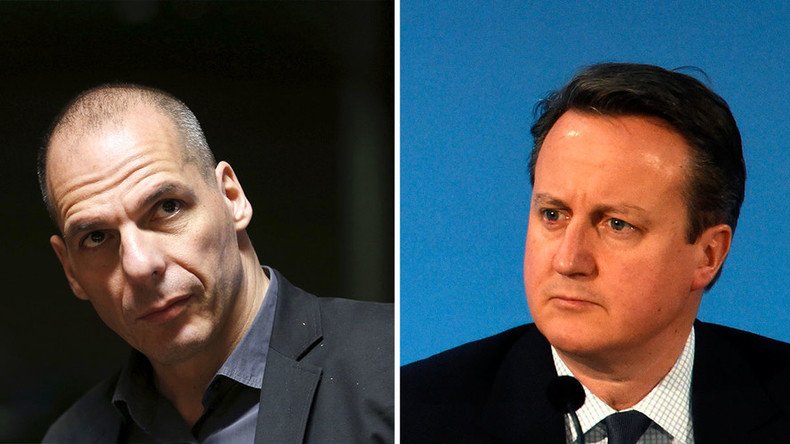Anti-democratic, unaccountable EU unfazed by Cameron’s reforms – Yanis Varoufakis

Brussels’ blatant disregard for democracy and lack of accountability will remain unfettered by David Cameron’s hollow attempts at negotiating EU reform, Greece’s former finance minister Yanis Varoufakis has said.
Writing in the Guardian on Friday, Varoufakis sharply criticized the British prime minister's negotiation efforts on the European stage. The former finance minister said the PM’s draft deal with Brussels will do nothing to address the gaping democratic deficit at the heart of the EU.
Varoufakis, who is a game theorist and fierce opponent of austerity, said Brits’ aversion to the EU is instinctively correct. However, he cautioned against a Brexit, saying it would be unwise.
Varoufakis said many Europeans are drawn to the idea of scrapping the EU, while retaining a single market. Although Brexit campaigners insist such a move is possible, Varoufakis said their promise rests on a foundation of falsehood.
A 3rd Option for Britons: A new beginning for European democracy. THE GUARDIAN @DiEM_25 and our 9th Feb launch https://t.co/jDWwkWGvbT
— Yanis Varoufakis (@yanisvaroufakis) February 5, 2016
The economist said a true single market, with a level playing field, requires a single legislative framework. Such a single market also requires universal industry, labor and environmental protection standards and courts that will enforce them, he said. Varoufakis stressed such a set-up would inevitably need a common parliament that writes legislation to be enforced across the single market and an executive official that implements court rulings.
Reflecting on whether Brits would endorse such an institution, he said they are too devoted to the concept of a sovereign national parliament to do so.
Adopting a philosophical lens, he compared the EU with the nation states that make it up. In the case of Britain, he said it had evolved over centuries using a series of political mechanisms to constrain social and economic tensions between opposing groups. By contrast, he said the EU and its “Brussels bureaucracy” was founded as a cartel.
Varoufakis said this cartel and its architects have long feared democracy and despised the concept of people-centered governance. He said the EU’s democratic deficit was increased by introducing depoliticized decision-making and tainting policy-making with “pseudo-technocratic fatalism.”
The former finance minister said this overarching trend has led to the erosion of democracy at EU level and poor economic policies across the continent. He said EU states like Britain that were sensible enough to remain outside the Eurozone have still been affected by the continent’s crippling economic crisis.
Varoufakis said neither a retreat into the cozy cavern of the nation state nor a complete surrender to the “democracy free zone” that is the EU are necessary. An alternative path, he suggested, is possible. The Marxist economist predicted this alternate path would be orchestrated by Europeans determined to regain agency over their lives from “unaccountable technocrats, complicit politicians and opaque institutions.”
He concluded ordinary Europeans must democratize the EU if its utter disintegration is to be avoided.
His comments come as a new YouGov poll, which was conducted in the aftermath of Cameron’s draft deal on Britain’s EU membership, indicated a majority of Brits favor leaving the union.
The survey, which was commissioned by the Times newspaper, found that 45 percent of respondents support a Brexit, while 36 percent oppose it. A fifth said they are undecided.
Cameron campaiging to remain in EU, but #LeaveEU ahead by 4 points in poll of British public https://t.co/VKZL9u88lqpic.twitter.com/Pd8favdzyL
— Global Observatory (@IPI_GO) February 4, 2016
The survey was carried out in the 48 hours after Cameron’s agreement on Britain’s EU membership was published. It suggested the proportion of would-be voters in the referendum wishing to leave the bloc had increased by three points since last week.
Political analysts in Britain have become increasingly doubtful of opinion polls’ ability to accurately measure the public mood on important issues since their spectacular failure to predict the outcome of the 2015 general election. Nevertheless, the results of the poll will likely unsettle Cameron, who had publicly declared his draft deal with Brussels to be a success.
The survey coincides with Cameron’s diplomatic tour of Europe to ramp up support for EU reform among politicians in Poland and Denmark ahead of a crunch meeting on his proposals later this month.
Cameron had been embroiled in talks on Thursday with European Council President Donald Tusk, German Chancellor Angela Merkel and Polish Prime Minister Beata Szydlo on the fringes of a conference on the Syria crisis held in London.
The PM is set to hold further discussions with Szydlo in Warsaw, Poland, before traveling on to Copenhagen for a meeting with Denmark’s Prime Minister Lars Lokke Rasmussen to drum up support for his proposed reforms. He will also meet the leaders of various political groups in the European Parliament on February 16, two days ahead of the leaders’ summit.












